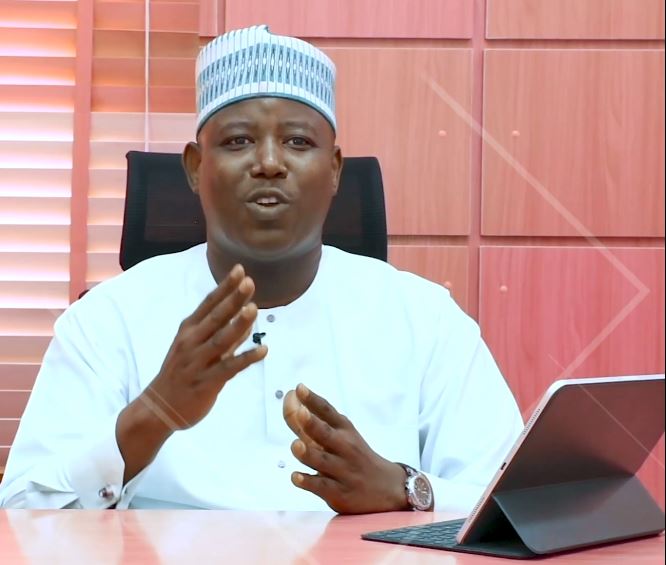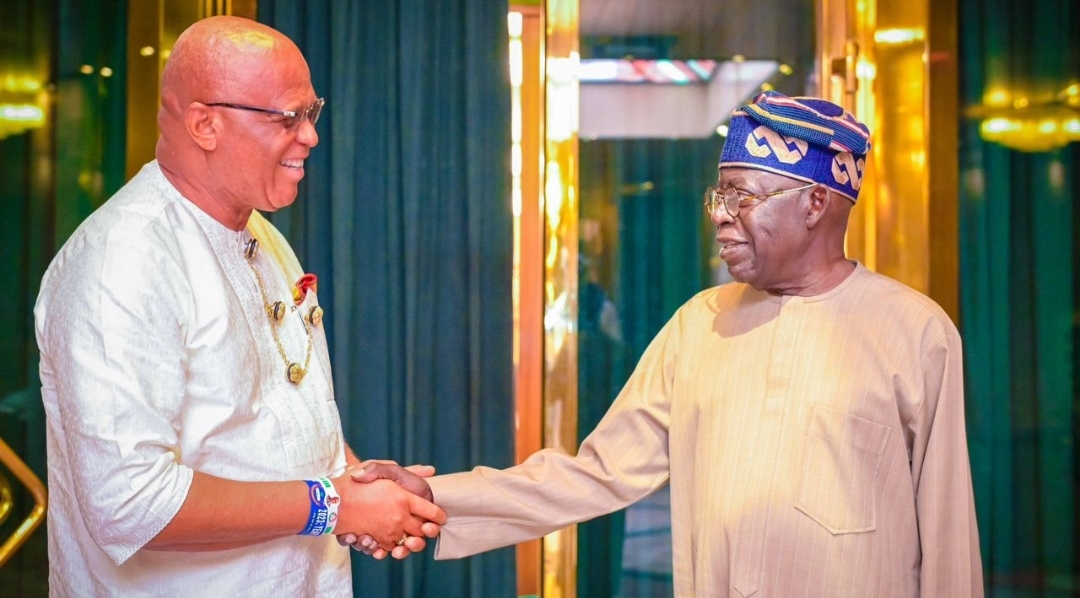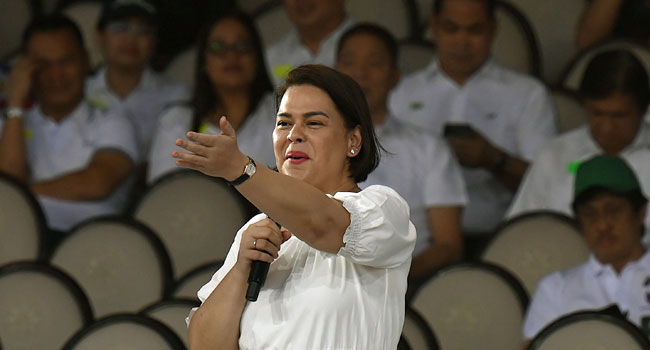Politics
The Political Economy of Nigeria: Current Challenges and Future Prospects

By Jamilu Yusuf
The political economy of Nigeria is a complex issue that has been the subject of much debate and discussion over the years. Nigeria is a populous country in West Africa with a mixed economy that heavily relies on oil exports. Despite its abundance of natural resources, the country has faced significant economic challenges, including high levels of poverty and income inequality, high inflation rates, and a lack of diversification in its economy. At the same time, Nigeria’s political landscape is also complex, characterized by political instability and corruption, both of which have had a significant impact on the country’s economic development.
One of the defining characteristics of Nigeria’s economy is its reliance on oil exports. In 2020, oil exports accounted for approximately 70% of Nigeria’s total exports, making it vulnerable to global oil price fluctuations. The over-dependence on oil has also meant that other sectors of the economy have been neglected, leading to a lack of diversification and a limited ability to absorb external shocks.
The result of this over-dependence on oil has been a significant challenge to the country’s economic development. One of the most pressing issues facing Nigeria is poverty. In 2020, Nigeria had an estimated poverty rate of 40%, with approximately 83 million Nigerians living below the poverty line. The poverty rate is particularly high in rural areas, where approximately 80% of Nigerians live. Income inequality is also a significant challenge, with the top 1% of Nigerians owning more than the bottom 50% combined.
Another significant challenge facing Nigeria is high inflation rates. The country’s inflation rate has been consistently high over the years, with the rate increasing to 18.17% in March 2021, the highest level in four years. The high inflation rate has had a severe impact on the country’s economy, making it more difficult for businesses to operate and increasing the cost of living for ordinary Nigerians.
Nigeria’s political landscape is also complex, with political instability and corruption being long-standing challenges. Nigeria operates a federal system of government, with a president as the head of state and a bicameral legislature. Political instability has been a significant challenge, with Nigeria experiencing several military coups and political crises since gaining independence in 1960. This instability has impacted the country’s economic development, making it challenging for businesses to plan and operate effectively.
Corruption is another significant challenge facing Nigeria’s political economy. Corruption is pervasive in Nigeria and is considered a significant barrier to economic development. The country ranks low on corruption indices, and corruption has been implicated in the mismanagement of public funds, weak governance, and social inequality.
Despite the challenges facing Nigeria’s political economy, there have been some efforts to address these issues. One of the most significant developments in recent years has been the government’s economic diversification efforts. The government has taken steps to reduce the country’s dependence on oil exports by promoting other sectors of the economy such as agriculture, manufacturing, and services. For example, the government has launched initiatives such as the Anchor Borrowers’ Programme, aimed at increasing agricultural productivity and creating jobs.
Efforts to address corruption have also been made. In 2020, the Nigerian government launched a new anti-corruption campaign aimed at strengthening institutions and reducing corrupt practices. The campaign has led to the prosecution of several high-profile individuals, including politicians and business leaders.
Looking ahead, Nigeria’s political economy faces several challenges and opportunities. One of the significant challenges is the impact of global economic conditions, such as the COVID-19 pandemic, which has had a severe impact on the country’s economy. The country’s political landscape after the 2023 presidential election and governorship elections was initially worrying but tensions have mostly doused by now.
At the same time, Nigeria has significant opportunities for economic growth and development. The country has a young and growing population, which could be a source of productive labour and entrepreneurship. The government’s diversification efforts also offer the potential for increased economic activity and job creation outside of the oil sector. Additionally, Nigeria is well-positioned to take advantage of the African Continental Free Trade Area (AfCFTA), which offers the potential for increased trade and investment across the continent.
The political economy of Nigeria is a complex issue that has been characterized by a reliance on oil exports, high levels of poverty and income inequality, high inflation rates, and political instability and corruption. Despite these challenges, there have been efforts to address these issues, including economic diversification and anti-corruption campaigns. Looking ahead, Nigeria’s political economy faces several challenges and opportunities, and the government’s success in addressing these issues will have significant implications for the country’s economic and social development.
Headlines
Akpabio Hails Okpebholo’s Supreme Court Victory, Calls It Triumph of Democracy

President of the Senate, Godswill Akpabio, has congratulated Governor Monday Okpebholo on his affirmation as the duly elected governor of Edo State by the Supreme Court, describing the ruling as a “triumph of democracy and the will of the people.”
Akpabio, in a statement personally signed and released on Friday in Abuja, applauded the apex court’s decision, saying it validated the mandate freely given to Okpebholo in the September 2024 gubernatorial election.
“What the apex court in the land has done is to affirm the will and wishes of the overwhelming majority of the people of Edo State. It shows that the election was transparent, free and fair,” Akpabio stated.
He added that, “The declaration by the Supreme Court in favour of Sen. Okpebholo against Mr Asue Ighodalo of the Peoples Democratic Party (PDP) has proven that elections are won at the ballot and by people who have identified with the grassroots.”
The Senate President said the judgment reaffirms the strength of Nigeria’s democratic institutions and the popularity of the All Progressives Congress (APC) in Edo State.
“This judgment has again reaffirmed the fact that democracy is at play and the people of Edo have wholeheartedly embraced the All Progressives Congress (APC) and popularly elected their preferred choice of Senator Okpebholo as their governor,” he said.
According to Akpabio, the ruling not only confirms Okpebholo’s mandate but also “paves the way for him to continue delivering exceptional service to the good people of Edo.”
He praised the governor’s performance in the past seven months, expressing confidence in his capacity to deliver more during his four-year tenure.
“My distinguished brother, His Excellency Senator Monday Okpebholo, on behalf of my family and constituents, the Senate of the Federal Republic of Nigeria, I extend my warmest congratulations to you and the wonderful people of Edo on this landmark victory at the Supreme Court.
“I wish you success and I assure you of the Senate’s support and collaboration in ensuring the state’s progress and development.
“Congratulations once again, Gov Okpebholo. I look forward to a robust working relationship with you,” Akpabio added.
In a unanimous decision, a five-member panel of the Supreme Court led by Justice Mohammed Garba dismissed the appeal filed by the PDP candidate, Mr Asue Ighodalo, for lacking merit.
The apex court upheld the earlier rulings of the Court of Appeal and the Edo State Governorship Election Petition Tribunal, both of which declared Okpebholo of the APC as the valid winner of the election.
The court ruled that the appellant failed to provide credible and admissible evidence to support claims of electoral malpractice, including over-voting and substantial non-compliance with the Electoral Act.
It further held that the PDP candidate failed to call relevant witnesses to back up some of the evidence he tendered, particularly those involving the Bimodal Voter Accreditation System (BVAS).
Some of the documents presented, the court noted, were simply “dumped” on the tribunal without demonstrating the alleged irregularities in 432 of the 4,519 polling units across the state.
Headlines
Akwa Ibom APC Gears Up to Receive President Tinubu as Governor Umo Eno Joins Party

The All Progressives Congress (APC) in Akwa Ibom State has announced its readiness to host President Bola Ahmed Tinubu and other top party leaders as it officially welcomes Governor Umo Eno into its ranks.
Speaking at a press briefing in Uyo on Friday, APC chieftain and former presidential aide, Senator Ita Enang, disclosed that the party was fully prepared to receive the president, Vice President Kashim Shettima, APC National Chairman, and governors elected on the party’s platform for the historic reception.
Governor Umo Eno had on June 6 formally defected from the Peoples Democratic Party (PDP) to the APC, in a move widely described as a political game-changer in Akwa Ibom.
Enang, a former Special Assistant to the President on National Assembly and Niger Delta Affairs, said the governor’s defection had effectively aligned the state with the central government.
He assured Governor Eno and his supporters that the APC would embrace them wholeheartedly and honour all agreements reached.
“As progressives, we shall work with the governor and his supporters to ensure that they fit into the party without hitches,” Enang stated. “We will also work with them to align programmes of the state government with the ideals and manifesto of the party.”
He further described the governor’s move as a “merger” that promises significant benefits for Akwa Ibom and its citizens.
The planned reception is expected to mark a major political event in the state, signaling a realignment of forces ahead of future elections.
Politics
Gov Yusuf directs aides to declare their assets

Gov. Abba Yusuf of Kano State has instructed all his political appointees to declare their assets.
Yusuf gave the directive during an Iftar (Ramadan breaking of Fast) with Heads of Government Agencies and Special Advisers at Government House, Kano.
The governor said that 60 to 70 per cent of the appointees had yet to comply with the Code of Conduct rules.
He urged them to promptly obtain, complete, and submit the necessary forms, to ensure compliance with the law.
Yusuf also addressed special advisers on the importance of providing counsel and submitting reports on governance matters.
He encouraged them to actively monitor government affairs and offer advice, whether positive or negative.
Yusuf also said that 13 Hajj seats bad been allocated to the Heads of Government Agencies.
Responding on behal of the appointees, Dr Rahila Mukhtar, the Executive Secretary of the Kano State Contributory Health Care Management Agency (KCHIMA), thanked the governor for his support.
The Secretary to the State Government, Malam Umar Ibrahim, reminded the appointees of their oath to execute their duties with justice.
Ibrahim urged them to remain committed to Yusuf’s mission and vision, prioritising transformation and improving the standard of living for citizens.
-

 Headlines3 years ago
Headlines3 years agoFacebook, Instagram Temporarily Allow Posts on Ukraine War Calling for Violence Against Invading Russians or Putin’s Death
-

 Headlines3 years ago
Headlines3 years agoNigeria, Other West African Countries Facing Worst Food Crisis in 10 Years, Aid Groups Say
-

 Foreign3 years ago
Foreign3 years agoNew York Consulate installs machines for 10-year passport
-

 News10 months ago
News10 months agoZero Trust Architecture in a Remote World: Securing the New Normal
-

 Entertainment3 years ago
Entertainment3 years agoPhyna emerges winner of Big Brother Naija Season 7
-

 Headlines1 year ago
Headlines1 year agoNigeria Customs modernisation project to check extortion of traders
-

 Economy1 year ago
Economy1 year agoWe generated N30.2 bn revenue in three months – Kano NCS Comptroller
-

 Headlines1 year ago
Headlines1 year agoPhilippines’ Vice President Sara Duterte resigns from Cabinet






